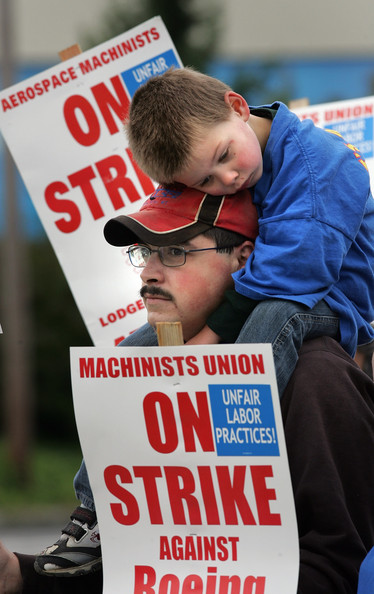
Following the filing by the International Association of Machinists for a NLRB election to be held to unionize Boeing’s plant in North Charleston, South Carolina, the company has been fairly vocal about its preferences to remain union-free in the Palmetto State.
As an example, if one were to be viewing a union-related article on a different web site, this Boeing-sponsored web ad might appear on their screen, which clearly has the words “vote NO” and directs the click to the Company’s WeAreBoeingSC.com website.

This begs the question: With tens of thousands of already-unionized workers across the United States, why is the airplane maker so opposed to its South Carolina plant becoming unionized?
The answer, in part, lies in the history of the plant itself, as well as why Boeing expanded its operations in North Charleston—and it all comes back to the union itself.
Because there are many more employees employed there now, as opposed to just a few years ago, many employees–and even some Charleston residents–may not recall that, not only was the North Charleston plant once unionized by the Machinists union, the real reason Boeing employs so many people in North Charleston is because of the Machinists’ union itself.
More specifically, due to the intransigence of the Machinists union in Puget Sound and the costs that the union’s strikes have had on the company are why the South Carolina plant became a second source of production for the airplane manufacturer.
It’s very public knowledge that the cost of Machinists union strikes is the reason Boeing expanded into South Carolina.
“The overriding factor was not the business climate. And it was not the wages we are paying today,” Jim Albaugh, the then-chief executive of Boeing Commercial Airplanes said back in 2010. “It was that we can’t afford to have a work stoppage every three years. And we can’t afford to continue the rate of escalation of wages.”
Although Albaugh’s statement was later used by the Machinists and the Obama-appointees at the National Labor Relations Board to attempt to prosecute the company for “unfair labor practices,” the case was leter settled between the company and the union.
However, Albaugh’s statement is no less true today than it was then.
Unions bring costs and risks to businesses, their employees and, in Boeing’s case, to customers and shareholders as well.
In fact, prior to the decision to shift some of its production to South Carolina, the Machinists in Puget Sound had struck Boeing four times over the last 20 years.
The Machnists last strike against Boeing occurred in 2008 and cost the company an estimated $2 billion.
In addition to the company’s losses, the Machnists’ strikers lost approximately $7,000 in wages and the 57-day strike in 2008 was estimated to cost the local economy around $200 million, according to the Herald Business Journal.
In fact, the risk factor is something that Boeing spells out clearly to analysts and shareholders on pages 13 and 14 of its annual report in PDF:
Some of our and our suppliers’ workforces are represented by labor unions, which may lead to work stoppages.
Approximately 65,000 employees, which constitute 38% of our total workforce, are union represented as of December 31, 2013. We experienced a work stoppage in 2008 when a labor strike halted commercial aircraft and certain BMA program production. We may experience additional work stoppages in the future, which could adversely affect our business. We cannot predict how stable our relationships, currently with 11 U.S. labor organizations and 6 non-U.S. labor organizations, will be or whether we will be able to meet the unions’ requirements without impacting our financial condition. The unions may also limit our flexibility in dealing with our workforce. Union actions at suppliers can also affect us. Work stoppages and instability in our union relationships could delay the production and/or development of our products, which could strain relationships with customers and cause a loss of revenues which would adversely affect our operations. [Emphasis added.]
It should be noted that the above is not “propoganda” Boeing is telling its workforce in South Carolina, it is from the company’s annual report—something most employees will never read.
That the Machinists union–through its costly strikes in Puget Sound and its prior poor performance in representing employees in South Carolina–helped Boeing in making its North Charleston plant a non-union success is without question.
That Boeing would like to keep it that way is also without question.
The only two questions that remain are 1) whether the Boeing employees in North Charleston realize the only reason most have jobs there is due to the Machinists union failings, and 2) whether they will vote to keep the union that would rather have seen the plant shuttered out of their plant.
Related:





